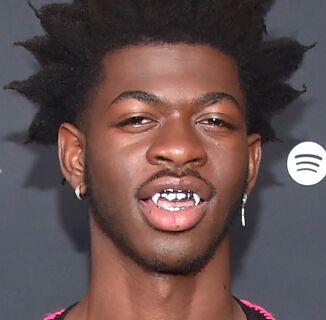Even though she had recorded under the name since 2006, it wasn’t until 2014 that Annie Clark truly became St. Vincent. In the wake of her critically acclaimed self-titled fourth album, Clark was invited to perform on the season finale of Saturday Night Live. She appeared to America fully-formed in high-fashion looks and spark-plug grey hair, quicksilver fingers pummeling an electric guitar. Over the course of two songs she stood stock still, breaking only to bob her head or strike a kabuki pose, looking as glassy and implacable about shredding as she did about being there.
It was a performance that riled the show’s casual viewers, who promptly kicked up a Twitter storm about her general weirdness and lack of technique. But these were massive and pathetic reaches. In truth they were uncomfortable with how seismically a woman had thrown down the gauntlet and how little they had seen themselves, or their traditions, reflected in her work. It was undeniable, the televised ascent of an all-new kind of rock star.
But for fans of Clark, that evening held a different resonance. Her talent was obvious, but her voice had never sounded more clear or certain. As excellent as her previous records had been, Clark’s presence in them could be hard to find. There was no question she identified with the women in her songs — well-adjusted on the outside, boiling with rage and desire on the inside — but the care she put into scoring elaborate wind sections served as its own kind of front, raw emotion tucked in folds of silk and velvet.
Now she stood before the country completely self-possessed, casting whimsy and preciousness aside, and laying the groundwork for the proudly queer, supermodel-dating guitar hero she’d become. It might have looked effortless, but in the process Clark had gone to hell and back, and it was on 2011’s Strange Mercy that she told the tale.
Strange Mercy is a mighty and mysterious record. It is a flawless work pieced together from many flawed parts — punishing doubt, paralyzing dread, and bottomless hurt. It is a deep dive into the moments when feelings overpower us, when the fronts we use to keep our emotions in check collapse under exhaustion, fury, and grief. I’ve described it to friends before as a concept album about the closet –- it certainly was to me — but in truth Strange Mercy is about every kind of closetedness. For anyone who has ever felt stifled, it is uncanny how Clark captures the experience in her wounded voice and roaring guitar.
Consider its album art. Where Clark had been content to play a doe-eyed waif or a steely ingenue on the covers of her first records, Strange Mercy is fronted by a latex-clad scream. While kink would become a vehicle for (goofy) transcendence in her later work, on Strange Mercy it is a band-aid against crushing despair. On opening track “Chloe in the Afternoon,” Clark switches perspectives between a businessman on his lunch break and the bored dominatrix he visits. “You’re all legs,” Clark coos as her guitar answers back with punishing, whip-like riffs: “I’m all nerves.” As her guitar curdles into heavier grunge territory, Clark’s pleas grow more desperate. “Heal my hurt!” she cries as time runs out. “White white shirt/back to work.” If there is any connection to be had between the two characters it is purely transactional — some pleasure, but mostly pain.
Missed connections haunt Clark throughout the album. On the flirty “Dilettante,” Clark tries in vain to bed a man and underscores her loneliness in doing so – “you’re like a party I heard through a wall /I’m always watching you through a keyhole.” In the throes of a bad romance, “Neutered Fruit” leaves her wondering “did you ever really care for me?/like I cared for you?” Throughout the album relationships are doomed by the distance that grows between real people and the defenses they’ve grown to shield themselves from pain.
The best tracks come about when Clark probes the distance between her defenses and herself. Where the old St. Vincent once declared “I’m not any-any-any-any-anything at all,” on “Cheerleader” she proudly asserts her personhood. “I-I-I-I-I don’t want to be a cheerleader no more” she wails, every thundering “I” punctuated with spikes of guitar. In the single’s music video, Clark is posed like an enormous Ron Mueck sculpture in an art gallery. Foisted up by ropes for visitors to look upon, she breaks free from her constraints, and takes a single step forward. As she does, her porcelain body collapses to the ground in a million chunks and shards, never to be put on a pedestal again.
“Surgeon” packs a similar punch, the druggy synths echoing her character’s depression as they race against her amazing finger-picked guitar. The chorus of that song is lifted from a line in Marilyn Monroe’s diaries addressed to her acting coach: “Best, finest surgeon – Lee Strasberg, come cut me open.” Clark finds the tormented plea beneath the tribute and embodies Monroe’s desperation to jaw-dropping effect. Whether the pills or her spirit wins out is anyone’s guess, but the mind-blowing solo that closes out the song suggests that she will fight for as long and as hard as she can.
It’s a pretty sick irony that the most inviting song is one of its bleakest. “Cruel” glitters open with an echo-y vocal that wouldn’t be out of place in a Disney movie, as Clark’s voice is joined by a skipping drumbeat and bouncy guitar line like pals on the way to meet the Wizard. As she builds to the chorus, Clark wonders aloud, “How could they be/casually/cru-u-u-u-u-uel” — the title stretched out and savored as if she’s found the right word to describe what’s ailed her all along.
The sound Clark developed on Strange Mercy can be heard all across indie rock today. It is present in U.S. Girls’ asymmetric guitar solos and Torres’ finger-picked excavations of love gone sour. You can hear it in Mitski’s atmospheric coo and Xenia Rubinos’ warm and threatening vocals. But the most important legacy of “Strange Mercy” is its wealth of compassion and care. Clark did so much more than just let her hair down. In owning her experience so totally, she not only found her own truth, but the space to love, forgive, and take on the pain of others. The title track is one of the only songs to ever make my black heart cry. It is addressed to a child in the midst of life-changing shock, meeting his long-absent father in prison. Clark looks him in the eye and offers her compassion, choking back her own sobs to offer him strength. “Oh little one/ I’d tell you good news that I don’t believe/ if it will help you sleep/ strange mercy.” The rock star had not yet arrived, but St. Vincent would always be there.
Help make sure LGBTQ+ stories are being told...
We can't rely on mainstream media to tell our stories. That's why we don't lock our articles behind a paywall. Will you support our mission with a contribution today?
Cancel anytime · Proudly LGBTQ+ owned and operated
Read More in Culture
The Latest on INTO
Subscribe to get a twice-weekly dose of queer news, updates, and insights from the INTO team.
in Your Inbox














